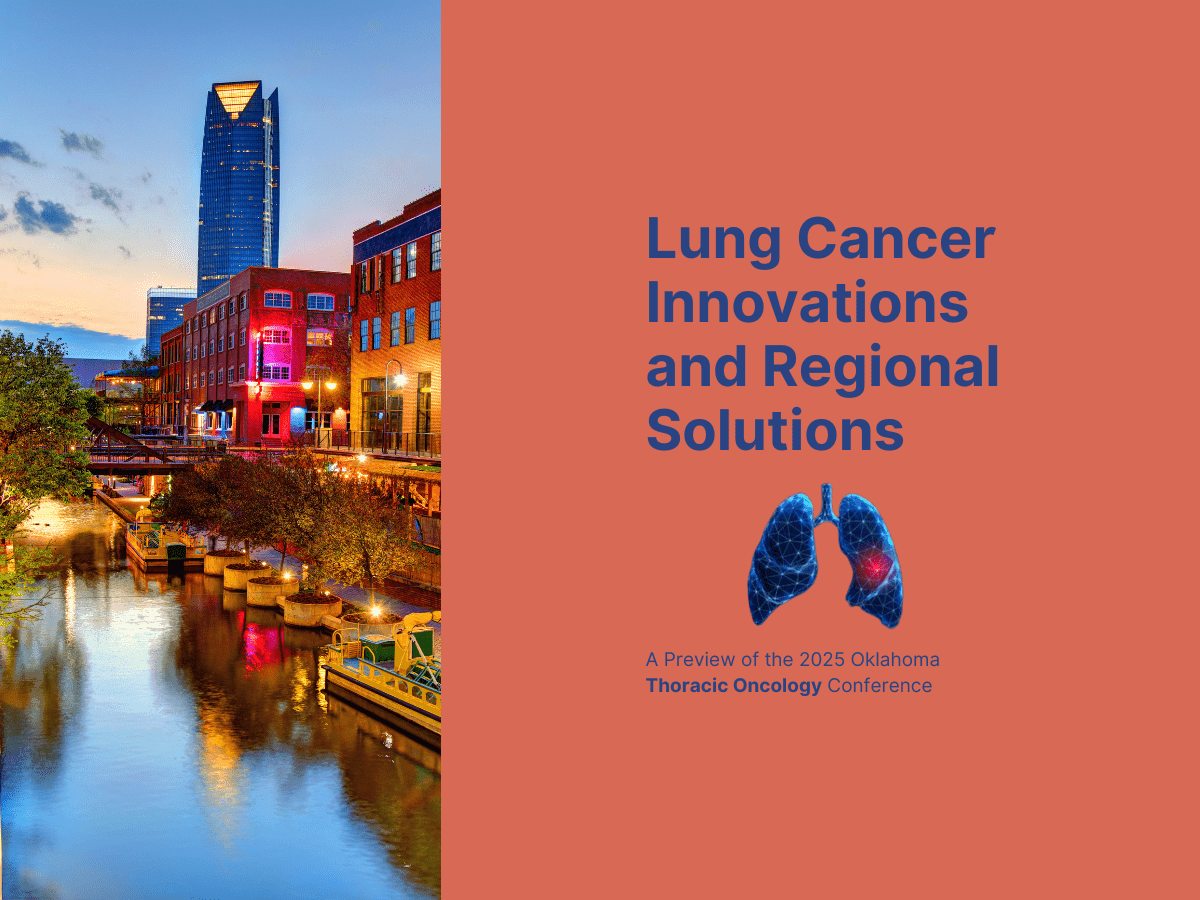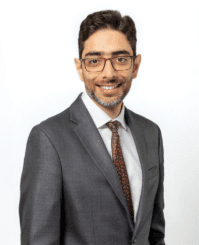Lung Cancer, Innovations, and Regional Solutions: A Preview of the 2025 Oklahoma Thoracic Oncology Conference

Author
Binaytara Team
Introduction
On March 21, 2025, Dr. Abdul Rafeh Naqash will be co-chairing the Oklahoma Thoracic Oncology Conference in Oklahoma City. In our interview, he discussed the conference's goal of showcasing emerging lung cancer developments, particularly recent FDA approvals for small-cell lung cancer treatments. He expressed optimism about advancements in lung cancer treatment and the importance of conferences in sharing critical information.
Highlights of Interview
Unique Regional Focus and Early Career Support
The Oklahoma Thoracic Oncology Conference fills a gap by being one of the first lung cancer-specific events in the Midwest/South Midwest, offering a platform for early and mid-career faculty to share insights and innovations. This is a departure from traditional meetings that predominantly feature established experts, promoting a more inclusive approach to advancing the field.
Advancements in Small-Cell Lung Cancer and Emerging Therapies
Significant progress has been made in the treatment of small-cell lung cancer, including FDA approvals for bispecific T cell engagers and immune checkpoint inhibitors. Understanding the disease's heterogeneity is key to developing personalized treatments, and new therapies targeting proteins like B7H3 show promise for improving patient outcomes.
Addressing Healthcare Disparities in Oklahoma
Dr.Naqash addresses the challenges faced by Oklahoma's predominantly rural population, including limited access to screenings, late-stage diagnoses, and barriers to clinical trial participation. By fostering collaboration between academic and community oncologists, the event seeks to improve cancer care accessibility and awareness for underserved groups in the region.
Interview
Question| Binaytara: What inspired you to organize this conference in Oklahoma?
Answer| Dr. Naqash: “This conference was organized to address the lack of lung cancer-specific meetings in the Midwest and South Midwest, including Oklahoma. Given the size of the United States, many states are often underrepresented in major oncology meetings.
Additionally, the conference aims to provide a platform for early and mid-career faculty in the lung cancer field. Rather than exclusively featuring established key opinion leaders, this event creates opportunities for emerging experts to share their knowledge, discuss new developments, and gain visibility in the field.”
Q: What are some of the key developments in lung cancer that will be highlighted at the conference?
A: “Over the past year or two, there have been significant advancements in lung cancer treatment. In small-cell lung cancer, we have seen multiple FDA approvals, which is very exciting. In the targeted therapy space, there have been major developments, particularly in EGFR-mutant lung cancer. Additionally, we will be discussing lung toxicities from immune checkpoint therapies and antibody-drug conjugates—an often overlooked but critical aspect of patient care.”
Q: How does the conference address emerging challenges in lung cancer treatment?
A: “One of our sessions focuses specifically on lung toxicity, a side effect of many novel treatments. We will also have translational biomarker talks on promising developments that may soon be implemented in clinical practice. Additionally, we are hosting debate sessions on perioperative and neoadjuvant immunotherapies, which are rapidly evolving areas where clinical approaches can vary.”
Q: Who will be speaking at the conference, and how is the program structured?
A: “We have put together a diverse lineup, including medical oncologists, surgeons, pathologists, nurse practitioners, pulmonologists, and pharmacists. Some will be speakers, while others will serve as panelists. We are also involving community oncologists from across Oklahoma to foster academic-community collaboration. The goal is to provide a well-rounded discussion that balances academic insights with real-world clinical perspectives.”
Q: What makes this conference unique?
A: “Unlike many other lung cancer meetings, which are often held on the coasts, this is one of the first dedicated lung cancer conferences in the Midwest/South Midwest region. It provides a platform for early-career and mid-career faculty to showcase their expertise, ensuring a mix of established experts and emerging voices in the field. We aim to foster a collaborative and educational environment that benefits all attendees.”
Q: Why do you think a debate format is effective for discussing lung cancer treatments?
A: “A debate format highlights different perspectives, which is important because not everyone practices the same way. As new treatments emerge, people develop varying perceptions, and it is valuable to explore how what works for one person may not work for another. It's not just about presenting a treatment as effective but understanding the logic behind different viewpoints. A debate also adds an entertaining element, especially depending on the speakers. Some speakers can make it really engaging, and the audience might even end up voting in favor of one argument or another based on who presents their case better. We did a similar debate last year on lung cancer topics, and it was very well attended. I believe it is going to be a great format again this year.”
Q: You will be speaking on emerging therapies in small-cell lung cancer in session 5. Can you share some of the recent developments in small-cell lung cancer treatments and how our understanding of the disease has evolved recently?
A: “In the last year, there have been two major approvals for small-cell lung cancer. The first is an accelerated approval for a bispecific T cell engager (BITE) called Tarlatamab, which is used in extensive-stage or metastatic small cell lung cancer after patients have progressed on first-line treatment. The second approval is for limited-stage small-cell lung cancer after chemoradiation, where an immune checkpoint inhibitor has been added.
Emerging therapies targeting novel proteins, such as B7H3, target certain cell surface proteins found in small-cell lung cancer cells. This is an exciting area for potential treatment options.
Over the past five years, we have gained significant insights into how small-cell lung cancer is a highly heterogeneous disease. It is becoming clear that a one-size-fits-all approach does not work for all patients. We now understand that there are different subtypes of small cell lung cancer, which has important implications for treatment and management.”
Q: What are some of the key challenges faced in cancer care in Oklahoma?
A: “Oklahoma has a predominantly rural population, and as the only NCI cancer center at the University of Oklahoma, we work closely with community centers to reach this population. Oklahoma ranks high in cancer cases, meaning there is a lot of work to be done. Additionally, there is a significant Native American population, some of whom live on reservations. We also serve a decent proportion of Black American patients. Disparities in healthcare access [for these underserved populations], such as delays in early screening and follow-up, contribute to late-stage cancer diagnoses.”
Q: What is the current situation with clinical trial participation for underserved populations in Oklahoma?
A: “We are seeing fewer approvals for clinical trials involving underserved populations, and there is definitely room for improvement in this area. We are working to increase participation and ensure that underserved groups have better access to clinical trials and treatments.”
Q: How can conferences help address these issues?
A: “Conferences like those organized by Binaytara, with a focus on relevant topics and engaging faculty, can help raise awareness of these disparities. While some of the content may be technical, the expertise shared will be valuable for both patient advocates and patients themselves. It is important to bring people together to discuss how to overcome these challenges and ensure better outcomes for everyone.”
Q: How has the focus on lung cancer treatments evolved over time?
A: “The focus has come in waves. About 15 years ago, the focus was on targeted therapies for EGFR and ALK. Then in the last 7-10 years, immunotherapies gained prominence. Now, the focus is shifting to novel therapies in small-cell lung cancer, and I expect this will be the area of major development for the next few years. It is important to stay up to date with these changes and engage in discussions about the latest advancements.”
Q: How do you address the broader needs of lung cancer patients?
A: “Beyond just treating cancer, it is important to integrate care with our palliative care colleagues and consider psychosocial factors. This means understanding the patient as a whole person and addressing their emotional, mental, and financial needs. Financial toxicity is an important aspect we focus on, and we have financial navigators and psychologists who support patients through this process. We have a dedicated team of financial navigators, clinical psychologists, and a palliative care team to ensure patients receive the necessary support. Our goal is to make patients as comfortable as possible while managing their care effectively.”
Q: What can attendees expect from the conference?
A: “The conference will cover developments in lung cancer from the last year or two, as well as what is expected in the next year or two. While it is impossible to predict exactly what will happen in 10 years, we have a good idea of what the near future holds. This will be a great meeting to learn about these developments and how we can work together to improve outcomes for lung cancer patients.”
Join us in Oklahoma City, Oklahoma, and be part of the conversation on revolutionizing patient care and expanding access to innovative therapies for rural communities nationwide and globally. To follow conversations online, use the hashtag #OKTO25.

Dr. Abdul Rafeh Naqash
About Dr. Naqash
Abdul Rafeh Naqash, MD is a medical oncologist specializing in early-phase clinical trials and immunotherapy at Stephenson Cancer Center at the University of Oklahoma College of Medicine. He trained at Government Medical College Srinagar, the University of Buffalo, East Carolina University, and the National Cancer Institute. His research focuses on lung cancer, immunotherapy biomarkers, resistance mechanisms, and immune toxicities, with work published in journals like JCO and JAMA Oncology.
Dr. Naqash has received prestigious awards, including the ASCO Young Investigator Award, the NIH Directors Award, the 40 under 40 in Cancer Award, and the NCI Director’s Award among many others. He serves in committee roles within SITC, ASCO, and IASLC and also regularly runs the podcast for JCO Precision Oncology.
We met with Dr. Naqash to discuss the impact of the upcoming conference in Oklahoma, the key themes and topics of discussion, and the existing disparities lung cancer patients encounter.